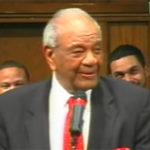MEMPHIS, Tenn. (ABP) — Fred Shuttlesworth, one of the last remaining lions of the Civil Rights Movement, received the Whitsitt Courage Award at a meeting of Baptist historians in Memphis, Tenn., June 19.
The award honors individuals who demonstrate “Baptist ideals of freedom and faith in the force of any and all tyrannies.” The William H. Whitsitt Baptist Heritage Society presents the award during the Cooperative Baptist Fellowship General Assembly each summer.
“Fred Shuttlesworth led the fight against racism, bigotry and segregation in the United States. His work, his ministry, has lifted the standing of Baptists,” noted Whitsitt Society president Kirby Godsey, who insisted Shuttlesworth “embodies the very meaning of courage.”
Shuttlesworth worked alongside Martin Luther King Jr. to guide the Civil Rights movement. He was pastor of Bethel Baptist Church in Birmingham, Ala., which was bombed three times, and the Ku Klux Klan bombed Shuttlesworth’s home on Christmas Day 1956.
“He pushed the United States a little closer to what Martin Luther King called ‘the beloved community’ and Jesus Christ called ‘the Kingdom of God,’” said Andrew Manis, associate professor of history at Macon State College in Macon, Ga., and author of a Shuttlesworth biography, A Fire You Can’t Put Out.
The Civil Rights Acts of the mid-1960s, which helped ensure the equal rights of Americans of all races, would not have been enacted without Shuttleworth’s leadership, Manis said. He presented the keynote address at the ceremony, during the Whitsitt Society’s annual breakfast.
“Nobody put his rear on the line in the black freedom struggle more than Fred Shuttlesworth did in Birmingham,” he said.
Modern-day Daniel
Referencing some of the key crisis points of the Civil Rights Movement, Manis said, “16 sticks of dynamite, the tenacity of [infamous Birmingham police commissioner] Bull Connor…and the occasional timidity of Martin Luther King did not hold him down. He was a modern-day Daniel in the lion’s den.”
Sign up for our weekly edition and get all our headlines in your inbox on Thursdays
The Whitsitt audience watched a documentary that showed a crowd beating Shuttlesworth when he tried to integrate Phillips High School by enrolling his children there. That event took place immediately after the KKK threatened castration and death for “anyone” who attempted to integrate Birmingham schools, Manis said, adding the threat was targeted for Shuttlesworth, the only parent who attempted integration.
Years later, Shuttlesworth sat in on debate about whether to build a museum focusing on slavery in the South. Shuttlesworth did not comment until another participant asked what he thought. “If you don’t tell it like it was, it can never be as it ought to be,” he told the crowd.
“That’s the best advice for preachers and historians, especially for white preachers whose track record for speaking out on race is abysmal,” Manis said.
Shuttlesworth’s “light” illuminated the evils of segregation, the foolishness of idolizing culture and color, and the myriad blights of racism, Manis said, noting Shuttlesworth’s “little light was lit by a fire you can’t put out.”
Long way to go
“We still have a long way to go to reach ‘the beloved community,’ and sin being what it is, we probably never will reach it,” he said. “But…nobility lies in being willing to accept reality” and taking on seemingly impossible challenges.
Shuttlesworth set the standard for Christians who want to eliminate racism by demonstrating courage “both in the pulpit and in the streets.”
Accepting the award, Shuttlesworth said, “I’m here to thank God for using me in moving forward the standards of bravery and courage and for letting him use me. I’m here to say what a great thing it is to stand up for God in a serious thing. Standing up is what God wants us to do.”
The Whitsitt Society and its award are named for an early president of Southern Baptist Theological Seminary, who lost his job in the late 1800s for persevering in his assertion — later widely affirmed by reputable historians — that Baptists date to the 16th century English Separatist movement rather than to John the Baptist, as many Baptists believed at the time.















We seek to connect God’s story and God’s people around the world. To learn more about God’s story, click here.
Send comments and feedback to Eric Black, our editor. For comments to be published, please specify “letter to the editor.” Maximum length for publication is 300 words.